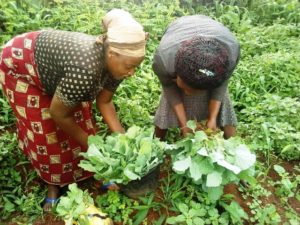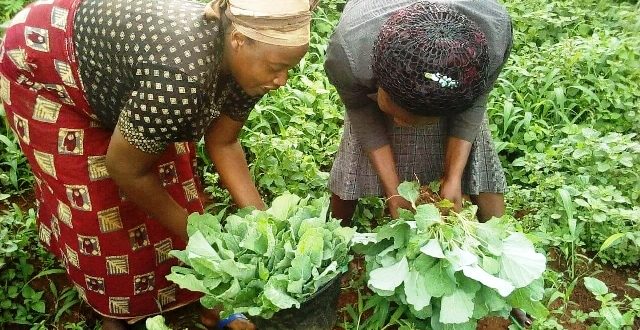By SARAH CIVIL
In the West Region of Cameroon lies Bana, a community made up of many economic migrant workers. Though largely a farmland and occupied by mostly farmers, many inhabitants of this community have access to less than a hector of land. Worsening conditions on these lands have led to low food production, which in turn have led to malnutrition and poverty. In an area that depends so much on the land, worsening farming conditions leave little opportunity for success.

In this to avert this plight that The Environment and Community Development Association (ECoDAs) Cameroon, with funding from the Pollination Project, USA, embarked on a project aimed at helping these Bana farmers learn sustainable smart food production leading to better-developed farms and a brighter future. Dubbed Empowering Poor Landless Farmers in Bana Village, Cameroon, the project launched in March and April 2019, and has since then helped in empowering numerous farmers through sensitization, formation of vegetable associations, capacity building, and vegetable nursery establishment.
Sensitization and Mobilization
ECoDAs started her strive towards realising the project’s goal by introducing 40 farmers to the idea of sustainable agriculture production and organic vegetable production in a formal setting and over 2000 throughout the project, leading to more organic productions in the area.
Formation of Vegetable Producer Association
After sensitisation and mobilisation, the organisation trained the farmers group on group formation, management and leadership and financial management and resource mobilization, accompanied by farm tools donation. This culminated in the rejuvenation of “Dynamic Organic Vegetable Gardeners”, whose membership had dropped from 22 to 31.
Capacity building training
Other areas of training included financial management and resource mobilization, soil improvement techniques, vegetable nursery establishment, and management and monitoring. The knowledge gained was to strengthen their ability so they can succeed on their own with the resources available to them. ECoDAs also provided start-up alongside seedlings and organic fertilizer to project beneficiaries to ensure that their new tools could be efficiently put to use.
Central Vegetable Nursery Establishment and Farmers Field School

With the newly trained and knowledgeable farmers, ECoDAs developed a central vegetable nursery, so the farming community could through it, also train others. The nursery acts as a buffer for project participants as they are starting to use their new knowledge on their own land and allows for trial and error by providing them with new seedlings if theirs do not succeed. This new central vegetable nursery also acts as the home ground for the Farmers Field School. Targeting both farmers-to-farmers and ECoDAs-to-farmers learning, the Farmers Field School will provide lessons on things such as proper land preparation. This is a space for both project participants and non-participants alike to learn and grow together, taking steps forward to become both sustainable and successful. ECoDAs has linked the farmers to buyers to enable them convert their produce into profit.







